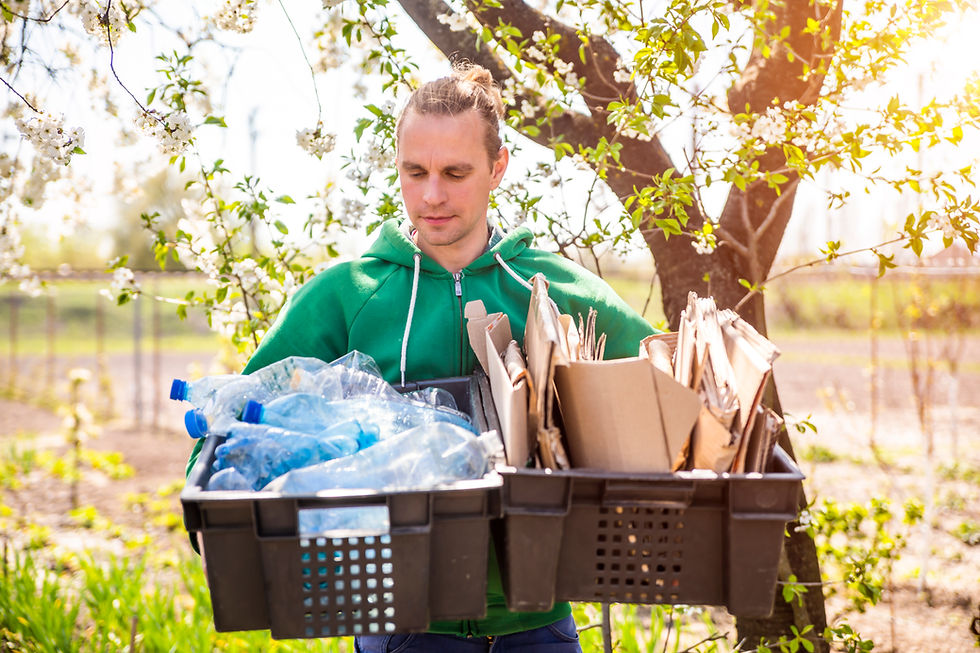Recycling: Do's & Don'ts
- Cas

- May 8, 2022
- 3 min read
Recycling in the UK is relatively straight forward - we have coloured bins with labels defining what can go in each bin. Following that, there's a ton of information online to help you decipher what can be recycled and what can't. Most of us are pretty clued up on the basics of recycling, but you might be surprised at some things you might be getting wrong - keep reading to find out.

Recycling Do's:
- Rinse out containers before recycling:
Everything that goes in the recycling bin should be empty of contents, clean of any residue & completely dry. Anything that doesn't meet these standards are classed as 'contaminated', and can no longer be recycled and will go to landfill. Not only that, but any other materials that are in the same batch as contaminated items also become contaminated and are sent to landfill.
- No need for bin liners:
Place recyclable items directly into your bins. This makes it much, much easier for the bins to be emptied. In fact, in most cases where people use bin liners for recycled materials, their bins are left un-emptied, as plastic liners can cause lots of issues at recycling sites.
- Remove labels/lids:
Most items with recycling information printed on them will specifically state which parts of the product are recyclable. Using bottles as an example, the cap and label are often not recyclable even though the actual bottle is. If you're not 100% sure, remove the cap and label to be on the safe side. This means the rest of the recycling wont become contaminated.
- Check with your local recycling services:
What and how you can recycle can differ area to area, so you're always best off checking with your local recycling services. Here is an example of what I can put in the recycling bins at my home - check yours here.

Recycling Don'ts:
- Strictly No Black Bags!:
Black bin bags can't be recycled, so don't put them in your recycling bin. Instead, put your recyclables directly in the bin. They should be clean and dry when recycled anyway so this shouldn't be an issue. Recyclable materials that are put in plastic bags will not be recycled by bin crews as it causes cross-contamination issues and can also damage the machinery.
- Don't Recycle Plastic Bags With Your Other Plastics:
Carrier bags are being made from a variety of different materials nowadays. Most are recyclable, and some are even compostable, however you shouldn't be putting them in your recycling bins. Carrier bags made from plastic can be taken to most of your local supermarkets to be recycled. Alternatively, if you're up to having a go at a small project, you could attempt some of these cool DIY's to reuse them!
- Size Matters:
We shouldn't be recycling anything smaller than a bank card (including straws, loose bottle caps - metal and plastic - small pieces of foil, coffee pods, paperclips etc). These objects are too small to be sorted and can actually cause delays and damage to machinery.
- Don't 'Wish-cycle':
'Wish-cycling' is where you optimistically recycle non-recyclable objects. When this happens, we contaminate tons of otherwise recyclable materials. Sometimes though, things can appear recyclable when in fact they are not.
If you always keep in mind that combined materials = trash, you should be good to go. Also always be on the look-out for OPRL's (On-pack recycling label) to give you disposal instructions.

Top Tips For Easy Recycling:
- Have A System:
When you have a system and do things as you go, things tend to be much more manageable. The ideal situation is that you would have separate containers indoors for cardboard/paper & glass/plastic, ensuring everything remains separate all the way to the recycling centre!
- Squash Your Recycling:
If you squash down your recycling, you'll be able to fit more in your bins. This means there's less waste in your house, and it's a more worthwhile collection for the workers. Don't rip/cut things too small though! As we discussed earlier, everything that goes in your recycling should be bigger than a bank card.
- Take Measures To Reduce Waste:
By using reusable products/avoiding disposable items, not over-buying food, avoiding over packaged materials/looking for items in recyclable packaging, we can actually reduce the amount of waste we produce by quite a substantial amount. Despite recycling being a fantastic thing that we should all be doing, ideally we just wouldn't create so much waste to begin with.
Until next time!
- Cas x
Sources:



Comments